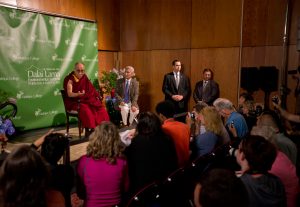Press Conference
 His Holiness held a press conference during one of the breaks at the Veterans Memorial Coliseum, where he first sketched out what he considers the three commitments of his life: explaining the idea that human happiness depends on concern for each other; fostering inter-religious harmony and, although he has now retired politically and has ended the Dalai Lamas’ role in Tibetan politics, the responsibility he retains to work to preserve the Tibetan religion, language and culture. He also expressed his view that media have an important role to present the public with a realistic view of the world. To do this they need to have a long nose, like an elephant’s trunk to sniff out what is going on, both up front and behind the scenes. Finally, he mentioned his conviction of the need to introduce secular ethics in our societies to bring a sense of inner values back into our lives.
His Holiness held a press conference during one of the breaks at the Veterans Memorial Coliseum, where he first sketched out what he considers the three commitments of his life: explaining the idea that human happiness depends on concern for each other; fostering inter-religious harmony and, although he has now retired politically and has ended the Dalai Lamas’ role in Tibetan politics, the responsibility he retains to work to preserve the Tibetan religion, language and culture. He also expressed his view that media have an important role to present the public with a realistic view of the world. To do this they need to have a long nose, like an elephant’s trunk to sniff out what is going on, both up front and behind the scenes. Finally, he mentioned his conviction of the need to introduce secular ethics in our societies to bring a sense of inner values back into our lives.
Asked what he looked forward to every day, he replied:
“I dedicate my body, speech and mind to the benefit of others, but that doesn’t mean I neglect my own interests. I need to keep up my health and strength if I am to be effective.”
And to a question about relations with China, he said:
“Things are changing, but the 1.3 billion Chinese people have a right to know the reality of what is going on and once they understand that reality, they are capable of judging right from wrong. Therefore, the censorship that currently exists in China is harmful, morally wrong and leads to a mistrust of the authorities. Meanwhile, Chinese peasants have a miserable lot that will only be relieved if the Chinese legal system is brought up to international standards.”
Interview for Forthcoming Documentary Film
His Holiness the Dalai Lama began his final day in Portland by giving a short interview to be included in an environmental documentary being created by Maitripa College. He expressed a concern not just for those alive today, but for future generations, suggesting that ecological problems may not affect us, but they will affect them if we don’t act.
Asked how compassionate thought can change the world, he said: “One of my dreams, perhaps an impossible dream, is to harness the solar potential of places like the Sahara desert and to use the power to run desalination plants that will produce clean water. It’s a project that would have widespread benefits and would function on a scale that would require global co-operation.”
To a question about what makes him happy, he replied, “Seeing other people smile.”


